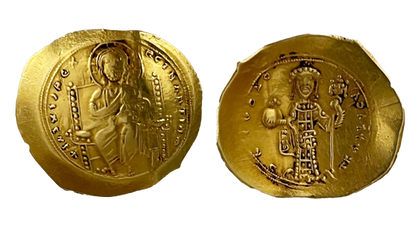Byzantine Gold Coin Detected with Fusion Pro Plus

Detected with
OKM Fusion Professional Plus
Region: Türkiye
Estimated value: USD 2,400.00
Time of origin: 1060 AD
Weight: 4 g | 0.2 oz
A treasure hunter made an extraordinary discovery in Kars, Turkey. Hidden beneath the soil lay a beautifully preserved Byzantine gold coin, minted in the eleventh century during the reign of the legendary imperial family known as the Dukas dynasty. This type of coin is known as a histamenon, one of the most iconic currencies of the Byzantine Empire.

The Dukas Imperial Family
The Dukas dynasty shaped the Byzantine Empire during a turbulent era. Two emperors in particular left their mark on history: Constantine the Tenth and his son Michael the Seventh.
Constantine the Tenth ruled from 1059 to 1067, followed shortly afterward by Michael the Seventh, who held power from 1071 to 1078. Between their reigns, the throne was taken by Romanos the Fourth, a member of the noble Diogenes family and a key military figure.
The Byzantine Empire itself endured for more than one thousand years, from the division of the Roman Empire in 395 until its fall to the Ottoman Empire in 1453. As the cultural and political successor to Rome in the East, the empire left behind one of the richest collections of art, coinage and religious symbolism in the world.
The gold coin weighs approximately four to five grams and was found using the OKM Fusion Pro Plus. This high performance 3D ground scanner is engineered for deep detection and has enabled treasure hunters to locate objects at depths of up to twenty one meters or sixty nine feet. The Fusion Pro Plus is particularly well suited for identifying underground tunnels, cavities and hidden artifacts such as coins, relics and valuable metal objects.


A Coin as a Symbol of the Church
The obverse of the coin presents Jesus Christ seated frontally, surrounded by the halo of the cross, a special divine symbol reserved exclusively for Christ. He is dressed in a pallium, holding the Gospel in his left hand while raising his right hand in blessing. This image emphasizes the sacred foundation of Byzantine rule, where religion and imperial authority were deeply intertwined.
The reverse depicts Emperor Constantine the Tenth, crowned and wearing a ceremonial garment known as the loros. In his right hand he holds the labarum, the famous military standard first carried by Constantine the Great during the battle at the Milvian Bridge around 312 AD. The labarum represents divine approval for imperial authority. In his left hand, Constantine holds the globus cruciger, a globe topped with a cross, symbolizing Christian dominion over the world.
The Histamenon and Its Declining Gold Content
The histamenon, alongside the tetarteron, served as the principal Byzantine gold currency from the ninth to the eleventh century. Early histamena contained up to ninety eight percent pure gold, equal to twenty two point eight carats.
Beginning in 1034, under Emperor Michael the Fourth, the gold content gradually decreased due to financial strain and political turmoil. The coin found in Turkey dates to the 1060s and is believed to contain around sixty six percent gold, equal to sixteen carats.
The histamenon was eventually replaced by the hyperpyron under Emperor Alexios the First. The new coin restored higher gold quality and became the foundation of Byzantine currency for centuries to come.

Frequently Asked Questions
What type of coin was found in Kars?
The coin is a Byzantine gold histamenon dating from the eleventh century during the reign of the Dukas dynasty.
Who were the emperors of the Dukas family?
The key rulers were Constantine the Tenth and his son Michael the Seventh. Their reigns shaped a significant period of Byzantine political and religious history.
What do the images on the coin represent?
The obverse shows Jesus Christ with the Gospel, while the reverse portrays Emperor Constantine the Tenth carrying the labarum and the globus cruciger, both symbols of sacred imperial power.
How much gold does this histamenon contain?
Coins from the 1060s typically contain about sixty six percent gold, equal to sixteen carats.
Which detector was used to find the coin?
The treasure hunter used the OKM Fusion Pro Plus, a deep scanning 3D ground detector capable of locating objects up to 21 m (69 ft) deep.
Why did the gold content of Byzantine coins decline?
Economic pressures, military expenses and political instability led to the gradual reduction of gold purity in Byzantine coinage throughout the eleventh century.
What replaced the histamenon?
Under Emperor Alexios the First, the hyperpyron was introduced. It restored higher gold quality and became the main Byzantine currency for centuries.
Get Rewarded for Your Treasure Finds
You have also made discoveries and detected amazing artifacts and would like to share them (anonymously)? We look forward to reading and publishing your success stories!


